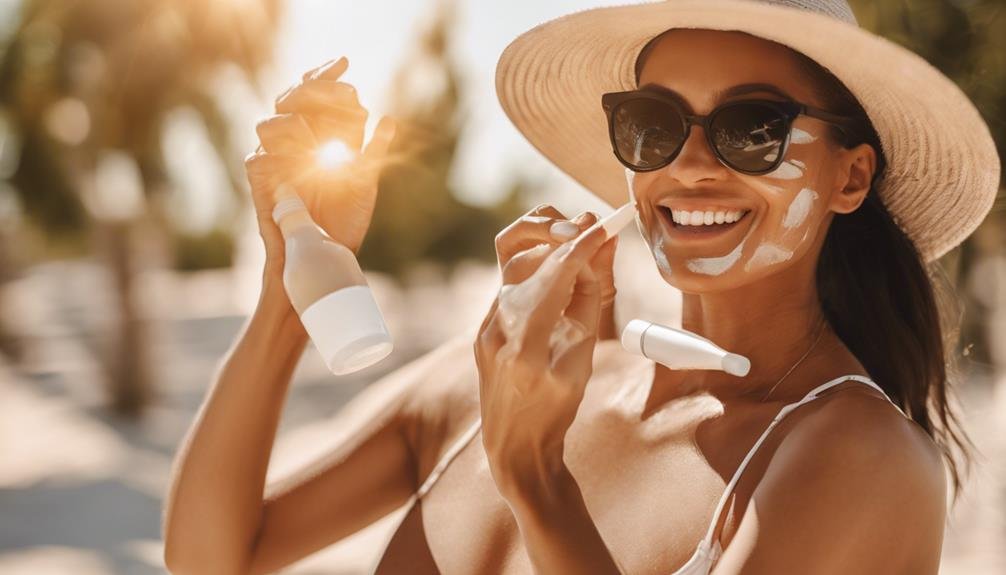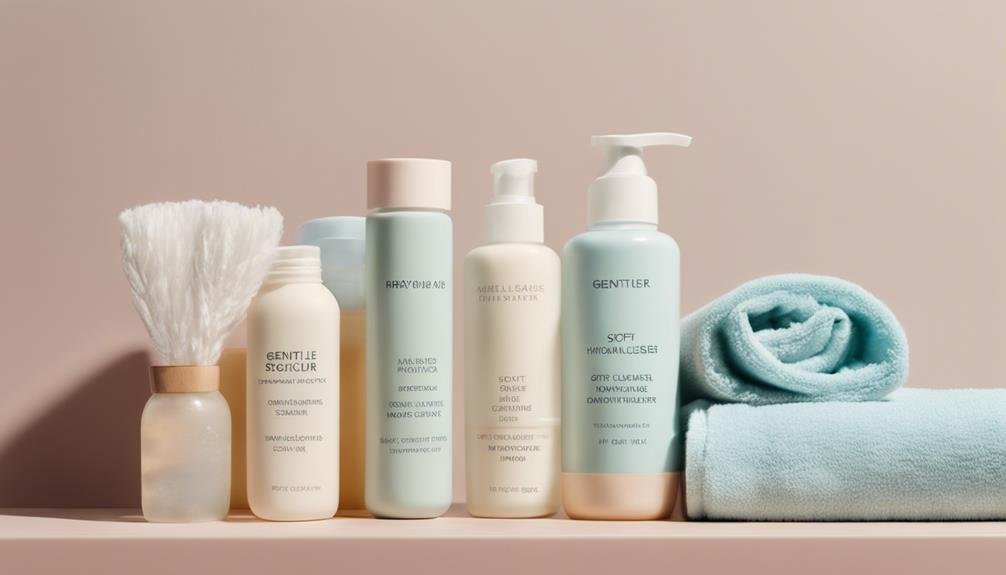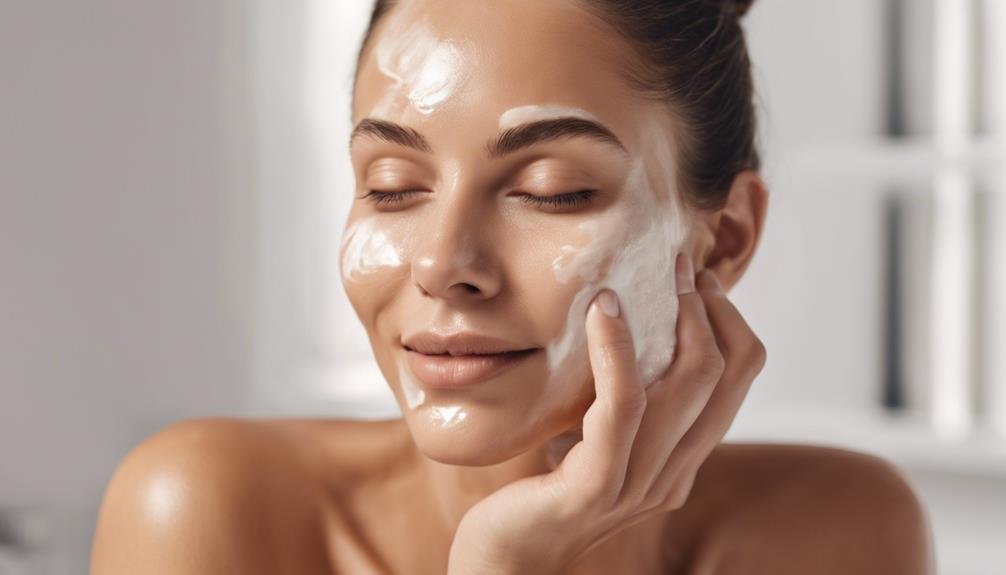"Cherishing Little Steps - A Haven for Baby and Family Journeys"
Simple Habits for Healthier Skin
To achieve healthier skin, you might be surprised by how a few simple habits can make a significant difference. By incorporating easy-to-follow routines into your daily life, you can enhance the overall health and appearance of your skin. These habits can be the key to unlocking a radiant complexion and a boost in confidence.
Key Takeaways
- Stay hydrated by drinking enough water daily for skin elasticity.
- Follow a balanced diet rich in fruits, vegetables, and lean proteins.
- Use broad-spectrum sunscreen and protective clothing for sun protection.
- Establish a consistent skincare routine with gentle products.
- Regularly consult a dermatologist for skin checkups.
Hydration

Ensuring proper hydration is essential for maintaining healthy skin. Water is crucial for skin health as it helps to maintain elasticity, flush out toxins, and keep skin cells plump and vibrant. When you're dehydrated, your skin can appear dull, dry, and may even exacerbate conditions like acne or eczema.
The Institute of Medicine recommends about 3.7 liters (125 ounces) of water per day for men and 2.7 liters (91 ounces) for women, but this can vary based on individual factors like activity level and climate.
To ensure your skin stays hydrated, it's not just about drinking water. Incorporating water-rich foods like fruits and vegetables into your diet can also contribute to your overall hydration levels. Additionally, using a good moisturizer can help lock in moisture and prevent water loss from the skin.
When choosing a moisturizer, look for ingredients like hyaluronic acid and glycerin, which are known for their hydrating properties.
Cleansing
For optimal skin health, proper cleansing is a crucial step in your skincare routine. Cleansing helps remove dirt, oil, makeup, and impurities that can accumulate on your skin throughout the day. It also allows your skin to breathe and function properly. When choosing a cleanser, opt for a gentle formula that suits your skin type. Avoid harsh ingredients that can strip your skin of its natural oils, leading to dryness or irritation.
To cleanse effectively, start by wetting your face with lukewarm water. Apply a small amount of cleanser and gently massage it onto your skin using circular motions. Be sure to focus on areas prone to oiliness or where makeup tends to accumulate. Rinse thoroughly with water and pat your skin dry with a soft towel.
Aim to cleanse your face twice a day, in the morning and evening, to maintain a clean and healthy complexion. Remember, consistency in cleansing is key to achieving radiant and glowing skin.
Sun Protection

Regularly shielding your skin from the sun's harmful rays is essential for maintaining its health and preventing premature aging. Sunscreen is a crucial component of any skincare routine. Choose a broad-spectrum sunscreen with an SPF of 30 or higher to protect against both UVA and UVB rays. Apply sunscreen generously at least 15 minutes before going outside and reapply every two hours or immediately after sweating or swimming. Don't forget to cover often neglected areas like your ears, neck, hands, and feet.
Aside from sunscreen, seek shade during the sun's peak hours, usually between 10 a.m. and 4 p.m. Wear protective clothing, wide-brimmed hats, and sunglasses with UV protection. Remember that even on cloudy days, UV rays can still penetrate the clouds and harm your skin.
Consistent sun protection not only prevents sunburns and skin damage but also reduces the risk of skin cancer. Prioritize safeguarding your skin from the sun to maintain its health and vitality in the long run.
Moisturizing
Nourishing your skin with adequate moisture is a fundamental aspect of a healthy skincare regimen. Moisturizing not only helps maintain skin hydration but also supports its barrier function, protecting it from environmental aggressors. Finding the right moisturizer for your skin type can make a significant difference in how your skin looks and feels. Here are some key considerations to keep in mind when choosing a moisturizer:
| Skin Type | Recommended Moisturizer |
|---|---|
| Dry Skin | Cream or ointment-based moisturizers with hydrating ingredients like hyaluronic acid or glycerin. |
| Oily Skin | Lightweight, oil-free moisturizers or gels that are non-comedogenic to prevent clogged pores. |
| Combination Skin | Moisturizers with a balanced formula that hydrates dry areas without exacerbating oiliness. |
| Sensitive Skin | Fragrance-free, hypoallergenic moisturizers with soothing ingredients like aloe vera or oat extract. |
Healthy Diet

To maintain healthy skin, your diet plays a significant role in supporting skin health from within. Eating a balanced diet rich in fruits, vegetables, whole grains, lean proteins, and healthy fats can provide your skin with the essential nutrients it needs to stay vibrant and youthful. Antioxidants found in fruits and vegetables help protect your skin from damage caused by free radicals, while omega-3 fatty acids in foods like salmon and walnuts can help maintain skin's elasticity and hydration.
Incorporating foods high in vitamin C, such as oranges and bell peppers, can boost collagen production, promoting skin firmness. Additionally, zinc found in nuts, seeds, and legumes can help reduce inflammation and support overall skin health. Avoiding excessive sugar and processed foods is also crucial, as they can contribute to skin issues like acne and premature aging.
Regular Exercise
For optimal skin health, engaging in consistent physical activity is essential. Regular exercise not only benefits your overall well-being but also plays a significant role in promoting healthier skin.
When you work out, your body increases blood flow, delivering essential nutrients and oxygen to your skin cells. This process helps nourish your skin and improve its overall appearance by promoting collagen production, which enhances skin elasticity and reduces the signs of aging.
Additionally, exercise can help regulate hormone levels and reduce stress, both of which are crucial factors in maintaining healthy skin. Sweat produced during exercise can also help flush out toxins from your skin, contributing to a clearer complexion.
Aim for at least 30 minutes of moderate physical activity most days of the week to reap the skin benefits of regular exercise. Remember, staying active not only boosts your skin health but also enhances your overall quality of life.
Sleep

Achieving optimal skin health involves more than just skincare products; it also requires attention to your sleeping habits. Quality sleep is crucial for skin rejuvenation and repair. During deep sleep, growth hormones peak, aiding in the repair and regeneration of skin cells. Lack of sleep can lead to increased cortisol levels, which can break down collagen, causing premature aging and dull skin. Aim for 7-9 hours of quality sleep each night to support skin health.
Additionally, poor sleep can exacerbate skin conditions such as acne and eczema. Lack of sleep weakens the immune system, making your skin more susceptible to inflammation and breakouts. Establishing a consistent bedtime routine, avoiding screens before bed, and creating a comfortable sleep environment can help improve your sleep quality.
Prioritize restful sleep to promote healthier, glowing skin. Your skin will thank you for the rejuvenating benefits of a good night's sleep.
Stress Management
Amidst the hustle and bustle of daily life, managing stress is essential for maintaining healthy skin. When you're stressed, your body releases cortisol, a hormone that can lead to inflammation and breakouts on your skin. Finding effective stress management techniques can help keep your skin clear and glowing.
One way to manage stress is through regular exercise. Physical activity releases endorphins, which are chemicals in the brain that act as natural painkillers and mood elevators. Exercise can help reduce stress levels and improve your overall well-being, which can have a positive impact on your skin.
Another effective stress management technique is mindfulness meditation. Taking a few minutes each day to focus on your breath and be present in the moment can help reduce stress and promote relaxation. Studies have shown that mindfulness meditation can lower cortisol levels in the body, leading to clearer skin.
Gentle Skincare Products

To maintain healthy and radiant skin, selecting gentle skincare products is crucial. When choosing your skincare products, opt for those that are free from harsh chemicals, fragrances, and dyes. Look for products with soothing ingredients like aloe vera, chamomile, and oat extract, which can help calm and nourish your skin.
Gentle cleansers are essential for removing dirt and impurities without stripping your skin of its natural oils. Choose a mild, non-abrasive cleanser that's suitable for your skin type.
Follow up with a gentle moisturizer to keep your skin hydrated and supple.
When it comes to exfoliation, be gentle and avoid harsh scrubs that can cause micro-tears in the skin. Instead, opt for chemical exfoliants like AHAs or BHAs, which can effectively slough off dead skin cells without causing irritation.
Avoiding Harsh Chemicals
When it comes to your skincare routine, one of the most important steps for maintaining healthy skin is avoiding harsh chemicals. Harsh chemicals can strip your skin of its natural oils, leading to dryness, irritation, and even long-term damage. Opting for products with gentle, natural ingredients can help protect your skin's barrier and keep it looking radiant.
Here is a breakdown of some common harsh chemicals to avoid in your skincare products:
| Harsh Chemicals | Potential Effects |
|---|---|
| Parabens | Hormone disruption |
| Sulfates | Stripping natural oils |
| Phthalates | Skin irritation |
| Formaldehyde | Allergic reactions |
| Synthetic fragrances | Skin sensitivity |
Consistent Routine

Within your skincare regimen, a consistent routine is key to maintaining healthy and glowing skin. Consistency allows your skin to adapt and benefit from the products you use. When you skip steps or use products sporadically, you disrupt the balance of your skin, making it difficult to see results.
To establish a consistent routine, start by identifying your skin type and specific concerns. Choose products that target these concerns and are suitable for your skin type. Consistency also applies to the timing of your routine. Aim to cleanse, moisturize, and apply treatments at the same times each day. This helps regulate your skin's functions and promotes optimal results.
Regular Skin Checkups
Regular skin checkups play a crucial role in maintaining the health of your skin. By scheduling regular appointments with a dermatologist, you can ensure early detection of any skin issues and prevent potential complications. Here's why regular skin checkups are essential:
- Early Detection: Regular skin checkups allow dermatologists to identify any suspicious moles, lesions, or changes in your skin that could indicate skin cancer or other skin conditions at an early stage. Early detection significantly increases the chances of successful treatment.
- Customized Skincare: Dermatologists can provide personalized advice on skincare routines, products, and treatments tailored to your skin type and concerns. This individualized approach can help you address specific skin issues effectively and maintain healthy skin in the long run.
- Peace of Mind: Knowing that a professional has assessed your skin health can provide peace of mind and alleviate any concerns you may have about unusual skin changes. Regular checkups can empower you to take proactive steps towards maintaining healthy and radiant skin.
Frequently Asked Questions
Can Certain Foods Cause Breakouts or Acne?
Certain foods can indeed cause breakouts or acne. Foods high in sugar, dairy, or refined carbohydrates may trigger skin issues. It's essential to pay attention to how your diet affects your skin to maintain a clear complexion.
How Often Should I Change My Pillowcase for Clearer Skin?
You should change your pillowcase every 2-3 days for clearer skin. This simple habit helps reduce bacteria and oil transfer onto your face while you sleep, preventing breakouts. Consistency in this routine can lead to healthier skin.
Is It Okay to Skip Moisturizer if My Skin Feels Oily?
You should not skip moisturizer even if your skin feels oily. Opt for a lightweight, non-comedogenic formula to maintain skin hydration without clogging pores. Proper moisturization helps balance oil production and keeps your skin healthy.
Can Wearing Makeup Every Day Harm My Skin?
Wearing makeup daily can clog pores, leading to breakouts and skin irritation. Ensure to cleanse your face thoroughly every night to prevent buildup. Consider makeup-free days to give your skin a chance to breathe and rejuvenate.
How Can I Prevent Maskne While Wearing Face Masks?
To prevent maskne while wearing face masks, cleanse your face before and after mask use, use a gentle cleanser, opt for breathable masks, avoid makeup under masks, and moisturize regularly. These habits can help maintain healthier skin.
Conclusion
In conclusion, incorporating simple habits for healthier skin can make a significant difference in your overall skin health and appearance. Take Sarah, for example. By staying hydrated, using sunscreen daily, and following a consistent skincare routine, she transformed her dry, dull skin into a radiant complexion. By making these small changes, you too can achieve glowing, healthy skin that you can be proud of. Remember, it's never too late to start taking care of your skin!

